- Homepage
- Herbs Spices
- Does Turmeric Help With Inflammation
Does turmeric help with inflammation?
Does turmeric help with inflammation of the joints and other organs?
Curcumin helps prevent inflammation; it is one of the chief active ingredients in turmeric. It is the bright yellowy-orange phytonutrient that is found in plants from the ginger family; natural phenols like this are known for numerous benefits and have long been used in herbal medicine. Is this just folklore? Is there any scientific substance behind these claims?
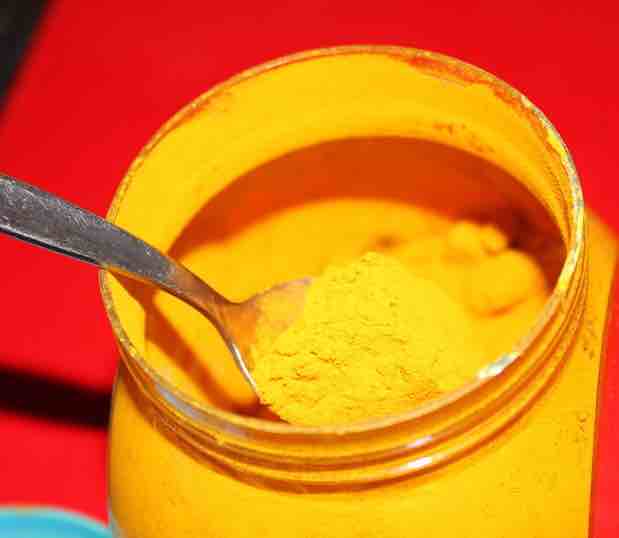
There is research confirming that turmeric helps with the control of blood-sugar, important for all of us but especially for diabetics; for arthritis and other conditions associated with inflammation.
This site is not really about treating specific conditions like osteoarthritis or diabetes with this or that; it rather concerns using small amounts of these important phytochemicals daily in our food. Prevention always was better than a cure and though totally ignored, still is today.
I am a firm believer that we eat food, not so much because of its mouthfeel and wonderful flavour but since it is good for us. The powerful theme in today's recipes is that you only have to enjoy those meals that titivate the taste buds; which almost certainly means there is plenty of added sugar and loaded with salt. And they are made from highly-refined ingredients that slide deliciously down the throat without the need for chewing.
Who eats chickpeas, dark-green leafy vegetables and pumpkin for their stunning flavour?
Luckily turmeric is one of those spices that will impart an enormously rich-flavour to these rather dull foods; take great pleasure in adding it daily in small amounts to your cooking.
Does turmeric help with inflammation? Yes, it certainly does. That is the underlying cause of the chronic degenerative diseases that kill far more people than viruses and bacteria[6].
Does turmeric help with inflammation?
Fast facts on diabetes
- 37.3 million Americans have frank diabetes.
- 96 million adult Americans have prediabetes.
- In total 39% of the population is seriously afflicted by chronically raised blood glucose.
- Over 65 years it's far worse. 49% have prediabetes[4].
Turmeric and diabetes
Does turmeric help with the inflammation always associated with
raised blood-sugar and diabetes in general? The research makes interesting reading.
Scientists reporting in the journal Nutrients[1] state that curcumin, one of the active ingredients in both turmeric and ginger delays diabetes development, improves the function of beta-cells in the pancreas and prevents their death; three very important concerns. It also makes our tissues more sensitive to the effect of insulin.
That means that even if we are significantly overweight, turmeric will in part ameliorate the noxious effect of raised blood-sugar; it will delay the onset of diabetes and increase the ability of our cells to take up glucose from the plasma.
However let it be plainly said; this does not mean license to consume meals high in refined starches. The Indian community in South Africa enjoys prodigious amounts of turmeric and ginger in its cooking, yet has one of the highest rates of diabetes and the associated heart-disease in the world.
Neither all the green tea in China, nor the turmeric in India will save us from the ravages of diabetes if we have an overly-sweet tooth and cannot resist the mouthfeel of white rice.
Does turmeric help with the inflammation of diabetes? Yes, it certainly does; add it to your food daily.
Turmeric and Parkinson's disease
Parkinson's disease is a pernicious illness affecting nearly 2% of older folk, causing tremors and difficulties with both standing and walking; cognitive-defects too.
Along with Alzheimer's disease it belongs to a group of conditions collectively known as neurodegenerative. Does turmeric help?
Specific cells in a nucleus located in the head known as the Substantia Nigra and in the lining of the colon now being called the "second-brain" are destroyed by certain toxins causing a depletion of dopamine. Medical treatment is directed at replacing this neurotransmitter; in the early stages there is symptomatic relief but long term the relentless progress of the motor and intellectual deterioration continues.
Scientists reporting in "Curr Pharm Des" state that there are several studies showing that curcumin because of its ability to cross the blood-brain barrier, can gain direct access to those cells that synthesise dopamine; and does have neuroprotective properties[2].
The Levodopa in broad beans is also a powerful anti-inflammatory that is able to cross the blood brain barrier, gaining direct access to the Substantia Nigra nucleus.
The emphasis as always is to protect those cells before they die, not after one has been diagnosed with the disease. The nitrites in processed meat, solvents used in dry-cleaning and certain herbicides have been fingered.
Turmeric and osteoarthritis
Osteoarthritis of the knee is the fourth leading cause of disability; the weight-bearing joints are increasingly at risk in an obese population. Hips and feet are thus also highly prone. Does turmeric help?
More than one third of adults in the USA suffering from arthritis reported work limitations. The inclusion of turmeric daily in their cooking would provide significant help.
In the early stages short term use of NSAIDs and other anti-inflammatory drugs are effective in pain control but over longer periods they have serious side effects. There is increasing interest in the use of herbs and spices in the management of wellness; so researchers decided to compare the effectiveness of curcumin, the active ingredient in turmeric with diclofenac, a commonly prescribed medicine for arthritis of the knee.
In this blinded study 149 patients with no history of stomach-ulcers were divided into two groups, one receiving curcumin and the other diclofenac. After 28 days they found that they both responded equally well in terms of pain and disability[3].
As you probably know, anti-inflammatory medication often causes stomach ulcers.
Just as important, the curcumin group lost weight; and nearly a quarter of those on NSAIDs required H2-blockers for stomach pain.
The researchers concluded that curcumin has similar efficacy to diclofenac and demonstrated better tolerance among patients with osteoarthritis of the knee.
In addition turmeric has at least five other Cox-2 inhibiting compounds over and above curcumin.
As an aside those taking antacids and H2-blockers should scrupulously avoid synthetic folic acid supplements. Get the vitamin rather from your food.
Turmeric and depression
Scientists have done what is known as a meta-analysis of six clinical trials[5] comparing turmeric with a placebo for depression and anxiety. The results were favourable and they conclude that it is efficacious; but more research with larger samples and covering a longer period is needed.
Turmeric and memory
Researchers have found that piperine in black pepper increases the bioavailability of curcumin, the active ingredient in turmeric and ginger[4]. As does enjoying these spices with fats such as those found in avocados, fish and nuts.
It is for this reason that we often use avocado smeared on our toast instead of butter when enjoying Eggs Hilton with a generous sprinkling of black-pepper.
Turmeric has also been shown to increase BDNF levels, a growth-hormone in the brain that stimulates the production of those neurons that improve memory.
It has also been shown to inhibit the formation of beta-amaloid, the plaque that blocks cerebral function in Alzheimer's disease.
Fermenting turmeric and natural honey into a mead is one other way of enjoying protection of our minds.
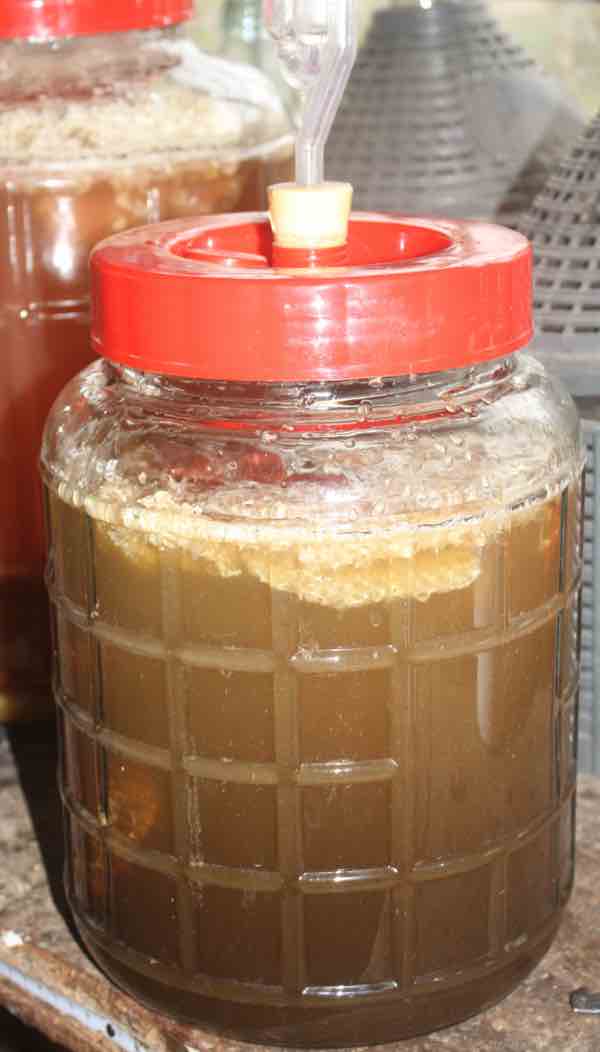
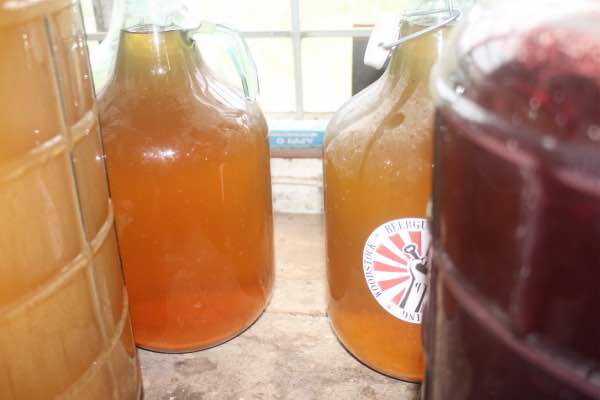 Demijohns of turmeric mead after the first racking; carboys of passionfruit and mulberry in the foreground.
Demijohns of turmeric mead after the first racking; carboys of passionfruit and mulberry in the foreground.Consumption of alcohol is a contentious issue; not least, even small amounts are associated with significantly increased cancer.
However there are confounding factors. Could it be the Roundup sprayed on the ground when growing wheat, the fungicides sprayed onto the grapes or the chemicals used to kill the potato haulm that are the guilty parties?
Those living in the Blue Zones of the world enjoy long and healthy lives despite drinking quite large amounts of natural unpasteurised alcohol.
Is the medicinal turmeric mead shown above an elixir of health and life? Or will it too cause cancer? No one is sure; it is also a natural probiotic. Certainly the taste is astonishingly good; it far outshines a glass of commercial wine.
As an anecdote that proves nothing, on a personal note I lost the ability to remember numbers for ten long year; even my own cellphone after a general anaesthetic. Then I became a health nut, even starting to brew my own alcohol. Could it possibly be the turmeric in our food and in that mead that restored my memory?
After those ten years I had lost all hope of being able to confidently recall my cellphone number again; now I have not the slightest difficulty. Will the alcohol in the mead I consume daily give me cancer instead? Only time will tell. In my upper seventies and in perfect health taking no medication, I am not anxious about such things.
"It has been estimated that 20% of Medicare beneficiaries have five or more chronic conditions; and fifty percent are taking 5 plus drugs."
Turmeric and obesity
There are two kinds of adipose tissue.
- White adipose tissue (WAT)
- Brown adipose tissue (BAT)
It is white adipose tissue that is associated with many diseases, especially when it accumulates in and around the abdominal organs.
Brown adipose tissue on the other hand has the capacity to produce heat in the body. In the literature it is known as Non-Shivering Thermogenesis (NST). It is the reason why some people just don't seem to feel the cold.
The curcumin in turmeric has the capacity to stimulate what is known as the "browning of White Adipose Tissue;" the formation of BAT cells in deposits of WAT. It turns bad fat in and around the organs into the healthier type[7].
Clinically scientists have found that curcumin is better absorbed in the presence of phospholipids, the fats found in white beans like soy and favas; in egg yolks and liver too.
Dishes like our Eggs Parkinson's Disease combine these different compounds to help in the browning of white adipose tissue; simple natural ways of promoting weight loss and lessening inflammation.
"Activation of brown adipose tissue (BAT) represents today a promising strategy to enhance energy expenditure (EE) through heat production."
- Frontiers in Physiology[7]
Turmeric also helps by regulating leptin, the "I'm feeling full" hormone.
Turmeric and dyspepsia
Around 1 in 5 adults suffer from reflux and gastric pain of one sort or another. Researchers compared turmeric with omeprazole[9] using a strong double-blind trial; the gold standard.
They found turmeric pills almost as effective as omeprazol (4.83 vs 5.46) for pain relief; and the scores for other symptoms found them equally powerful.
The turmeric was safe and well tolerated with none of the serious side effects of the medication[8]; a proton pump inhibitor.
The amount of turmeric was large; 2 grams of curcumin pills daily.
That is equivalent of 10tsp of the spice per day. Freshly-grated from the garden would most likely be more effective; it tastes much stronger.
"Curcumin and omeprazole had comparable efficacy for functional dyspepsia."
BMJ Evidence-Based Medicine
Two approaches to wellness
When becoming ill we start feverishly to look for a solution. For dyspepsia that would mean taking medication with serious side effects, a supplement of curcumin or a large amount of fresh turmeric.
The other approach focuses rather on prevention; small amounts of turmeric with our food daily.
Growing turmeric
This was our first young plant. It turned out to be a very rewarding journey but also an exercise in patience; some things cannot be hurried.
As a general rule I honestly believe that if you can grow it yourself, it will not only save you money but fresh spices and herbs are always better than those which have been dried. Oxygen does the damage; you can certainly taste the difference.
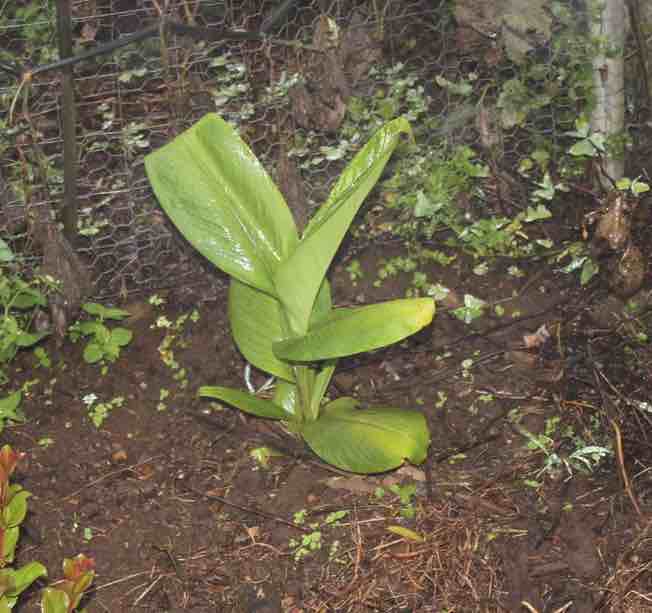
Alas a severe winter killed the plant and rhizome; or so I thought. To my surprise the turmeric survived the extreme weather, shot up in the spring and now two years later is almost ready to be harvested.
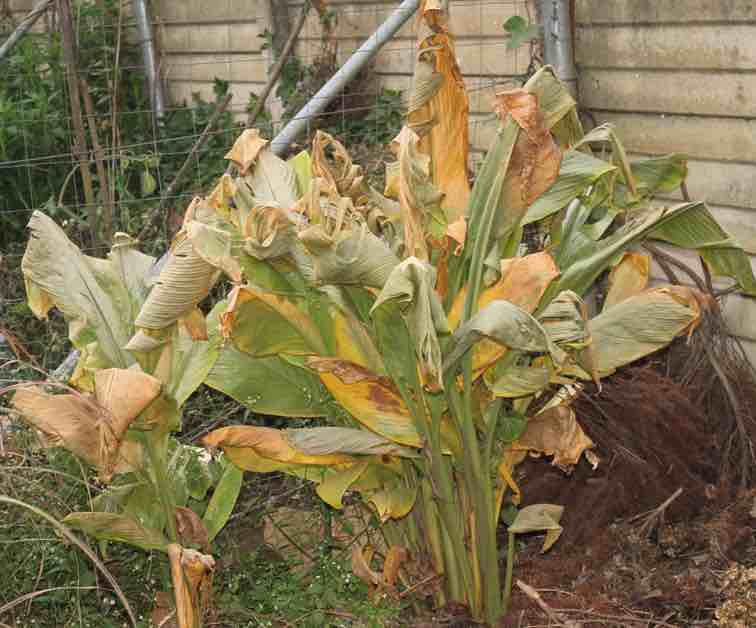
The turmeric rhizomes must first be cleaned thoroughly, broken into smaller thumb-sized chunks and then frozen for use during the whole year.
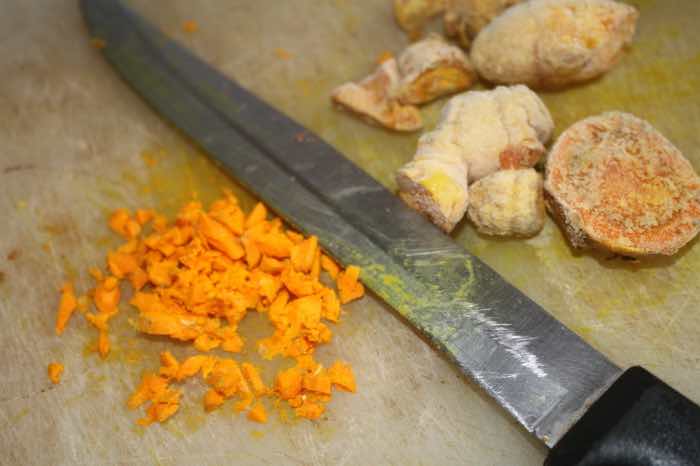
Grating the rhizome is easier with an inexpensive micro-planer.
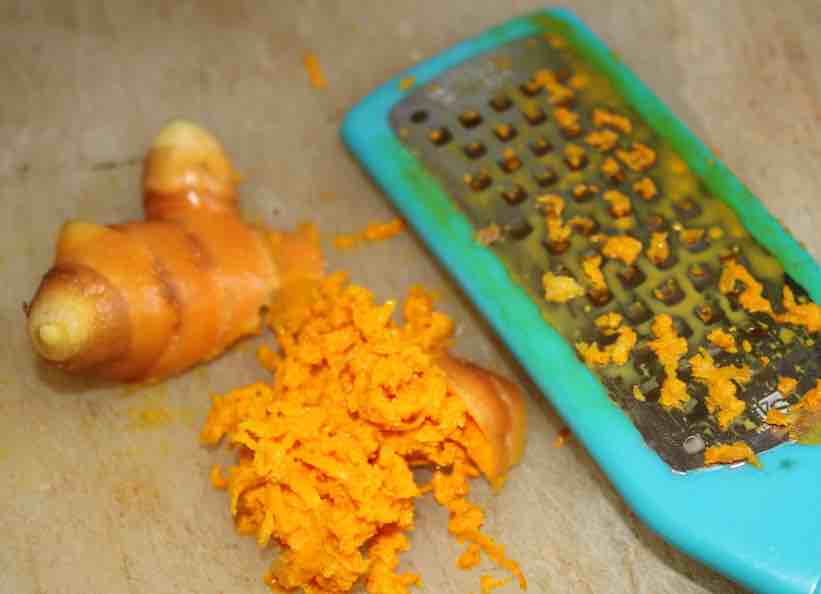 1 tsp of freshly-grated turmeric contains 200mg curcumin
1 tsp of freshly-grated turmeric contains 200mg curcuminEggs Hilton
The two plants above produced enough turmeric tubers to freeze half for the whole year, the rest being returned to the soil for the next season. A small chunk is grated every morning into our breakfast, known as Eggs Hilton.
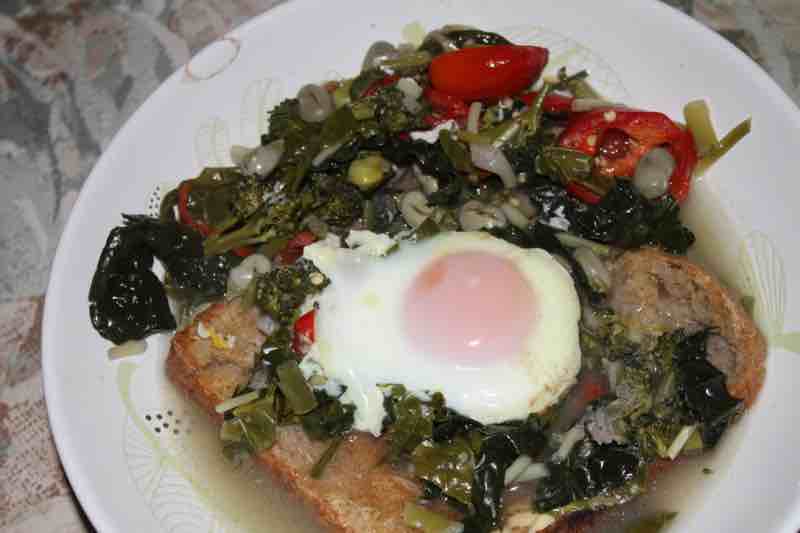
Eggs Parkinson's Disease
Turmeric can be used to enrich Eggs Parkinson's Disease; broad beans are the only natural source of L-Dopa. The capsaicin in hot peppers gives the dish additional flavour and further reduces inflammation. Toss in a chicken bone perhaps for more taste and to provide some gelatine.
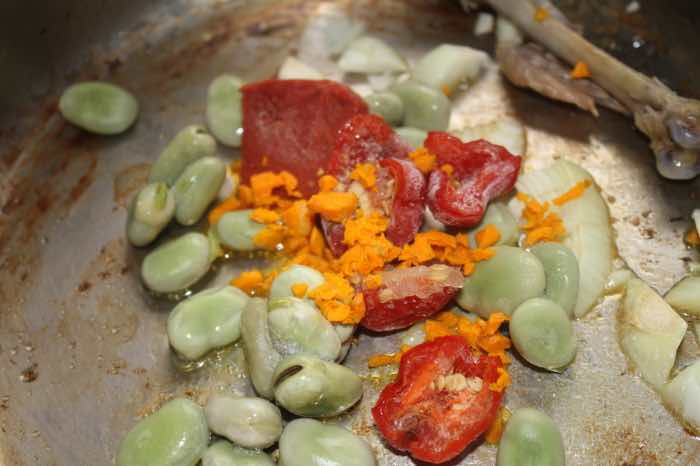 Turmeric and broad beans
Turmeric and broad beansShakshuka
Turmeric can enrich any dish; here it is used it to give yet more flavour to a bean and pepper shakshuka.
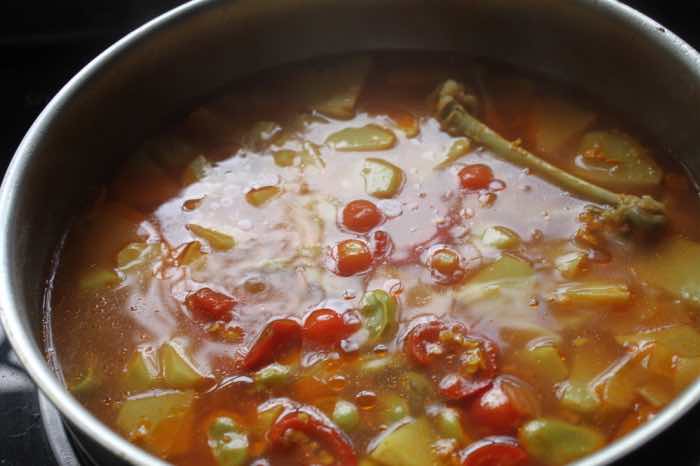
Enjoy your shakshuka with artisan sourdough bread for the perfect supper; rich in vegetable protein, it's a smorgasbord of anti-inflammatory phytonutrients together with a whole grain.
The Cancer Association recommends a legume and a whole grain at every meal.
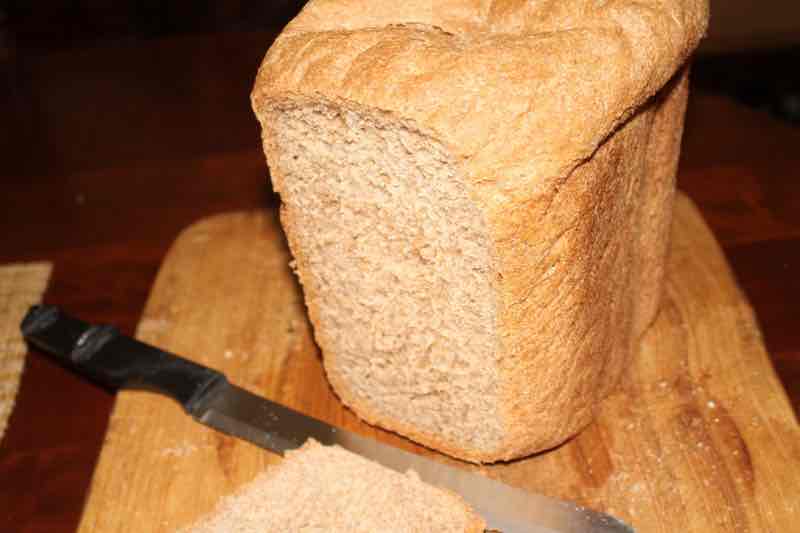 Wholegrain sourdough bread is soft and delectable
Wholegrain sourdough bread is soft and delectableDoes turmeric help with inflammation?
Does turmeric help with inflammation is a question often asked by those suffering from arthritis, for example in the knee.
Whole foods are chewy; and bits get stuck between the teeth. Interesting research proves that those who floss regularly to prevent inflammation of the gums are far less likely to have a stroke.
- Curcumin and Type-2 Diabetes Mellitus: Prevention and Treatment
- Curcumin: a potential neuroprotective-agent in Parkinson's disease. Web:
https://pubmed.ncbi.nlm.nih.gov/22211691/ - Safety and efficacy of curcumin versus diclofenac in knee osteoarthritis
- Using Black Pepper to Enhance the Anti-Inflammatory effects of Turmeric
- Clinical Use of Curcumin in Depression
- Potential Role of Flavonoids in Treating Chronic Inflammatory Diseases
- Food Ingredients Involved in White-to-Brown Adipose Tissue Conversion and in Calorie Burning
- Omeprazole side effects @ Mayo Clinic
- Curcumin and proton pump inhibitors for functional dyspepsia
When browsing use right click and Open Link in New Tab, or you may get a bad gateway signal.
The material expressed on this page is gleaned from the nutritional and environmental literature; it is clearly referenced. A plain distinction is made between the author's opinion and that which is scientifically proven. When in doubt consult your health professional.
To suggest a correction or clarification, write to Dr Bernard Preston here. Contact.
Newsletter
Our newsletter is entitled "create a cyan zone" at your home, preserving both yourself and Mother Earth for future generations; and the family too, of course. We promise not to spam you with daily emails promoting various products. You may get an occasional nudge to buy one of my books.
Here are the back issues.
- Lifestyle and ideal body weight
- What are ultra-processed foods?
- Investing in long-term health
- Diseases from plastic exposure
- Intensive lifestyle management for obesity has limited value
- A world largely devoid of Parkinson's Disease
- The impact of friendly bacteria in the tum on the prevention of cancer
- There's a hole in the bucket
- Everyone is talking about weight loss drugs
- Pull the sweet tooth
- If you suffer from heartburn plant a susu
- Refined maize meal and stunting
- Should agriculture and industry get priority for water and electricity?
- Nature is calling
- Mill your own flour
- Bake your own sourdough bread
- Microplastics from our water
- Alternative types of water storage
- Wear your clothes out
- Comfort foods
- Create a bee-friendly environment
- Go to bed slightly hungry
- Keep bees
- Blue zone folk are religious
- Reduce plastic waste
- Family is important
- What can go in compost?
- Grow broad beans for longevity
- Harvest and store sunshine
- Blue zone exercise
- Harvest and store your rainwater
- Create a cyan zone at your home
Did you find this page interesting? How about forwarding it to a friendly book or food junkie? Better still, a social media tick would help.
- Homepage
- Herbs Spices
- Does Turmeric Help With Inflammation
Address:
56 Groenekloof Rd,
Hilton, KZN
South Africa
Website:
https://www.bernard-preston.com